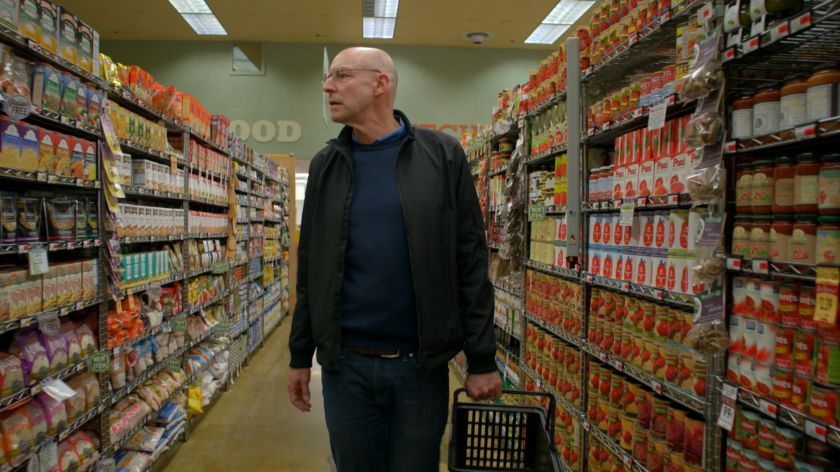Silent food is healthier than loud food
-
 Journalist Michael Pollan in the documentary In Defense of Food
Journalist Michael Pollan in the documentary In Defense of Food
The documentary In Defense of Food, which will be screened at the festival, shows you how to eat normally and healthily. Behavioural scientist Roel Hermans from Radboud University will discuss the film at LUX. Here, he explains why people tend to develop strange eating habits.
Rather read this article in Dutch?
Behavioural scientist Roel Hermans nods in agreement with this clip. ‘Food that isn’t advertised is usually better for you.’ Together, we watch the documentary that Hermans will discuss with the audience during InScience. The film fits the trend made popular by foodies, with their recipes and special diets, of super-healthy food as an antidote to our ever-expanding waistlines and our seemingly endless journey from fridge to fast food restaurant.
But you won’t hear the American Pollan tell people to stop eating eggs because you would be consuming chicken periods (The Green Happiness in NRC, late September). You also won’t see jars of vitamins or nutritional supplements in his film. Pollan’s message is clear, concise and repetitive: ‘Eat food, not too much, mostly plants.’
 Roel Hermans (1984) received his PhD with a specialisation in female eating patterns. He is currently researching how a ‘smart fork’ can help us eat more slowly. Hermans is also involved in various projects that aim to promote a healthy lifestyle among children. He will discuss the film In Defense of Food with sports dietician Saraï Pannekoek at 3:45 PM on Thursday 3 November at LUX.
Roel Hermans (1984) received his PhD with a specialisation in female eating patterns. He is currently researching how a ‘smart fork’ can help us eat more slowly. Hermans is also involved in various projects that aim to promote a healthy lifestyle among children. He will discuss the film In Defense of Food with sports dietician Saraï Pannekoek at 3:45 PM on Thursday 3 November at LUX.
‘What do we really know about our food?’ Pollan asks in the documentary. He shows viewers the history of human food consumption. The film reveals the agricultural and technological developments that prompted us to trade in real food for factory products which, according to the journalist, are not worthy of the term ‘food’. Internationally renowned nutrition experts paint a chilling picture of the health risks associated with consuming too much fat and sugar (hint: stop drinking soft drinks immediately!).
For Hermans, this is old news. As an ‘eating pattern psychologist’ who has collaborated with the Dutch nutrition centre several times, he is acutely aware of what’s healthy and what’s not. Hermans, who will be serving homemade banana bread during the film, finds it strange that so few people seem to really think about what they eat. And by that he means forming their own opinions about healthy eating. This also applies to followers of obscure food blogs. ‘We do strange things because it feels good,’ he explains. ‘As a way of showing other people how health-conscious we are. Drinking a protein shake after a workout is extremely gratifying because it’s a special product linked specifically to health and fitness. But you could also eat an egg or a bowl of soft curd cheese.’
‘We do strange things because it feels good.’
People on the other end of the spectrum – those from the lower economic classes who are increasingly becoming overweight – also fail to reflect on what they put in their mouths. And even if they do understand the difference between healthy and unhealthy choices, many people in this category often lack the financial resources to buy fresh products. The art is changing the behaviour of the group. ‘We can start by explaining that they can buy cheap fruits and vegetables if the go to the market at four o’clock on a Saturday,’ says Hermans. Or by calling on neighbourhood teams to help raise awareness among parents and children of the importance of sharing a hot meal together.
According to Hermans, we are more knowledgeable about food now than ever before. Nevertheless, it’s primarily the wealthier and more highly-educated members of society who are transitioning to fresh and ‘real’ food. Hermans expects that Pollan’s film will attract more people from this category to LUX. But he hasn’t lost all hope. Food awareness is slowly trickling down through all layers of society. ‘Secondary school pupils are getting used to seeing healthier lunches, while older children didn’t have these options.’ Hermans believes that if society as a whole stops purchasing factory food, manufacturers will be forced to offer alternatives.



